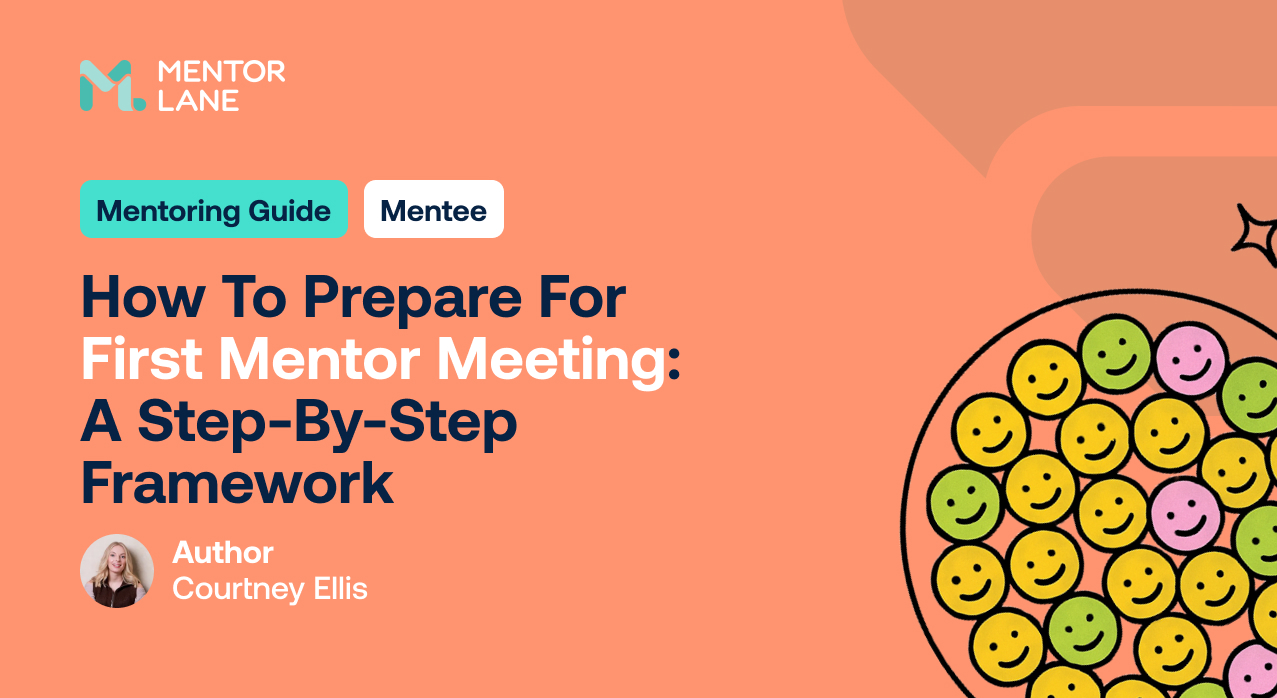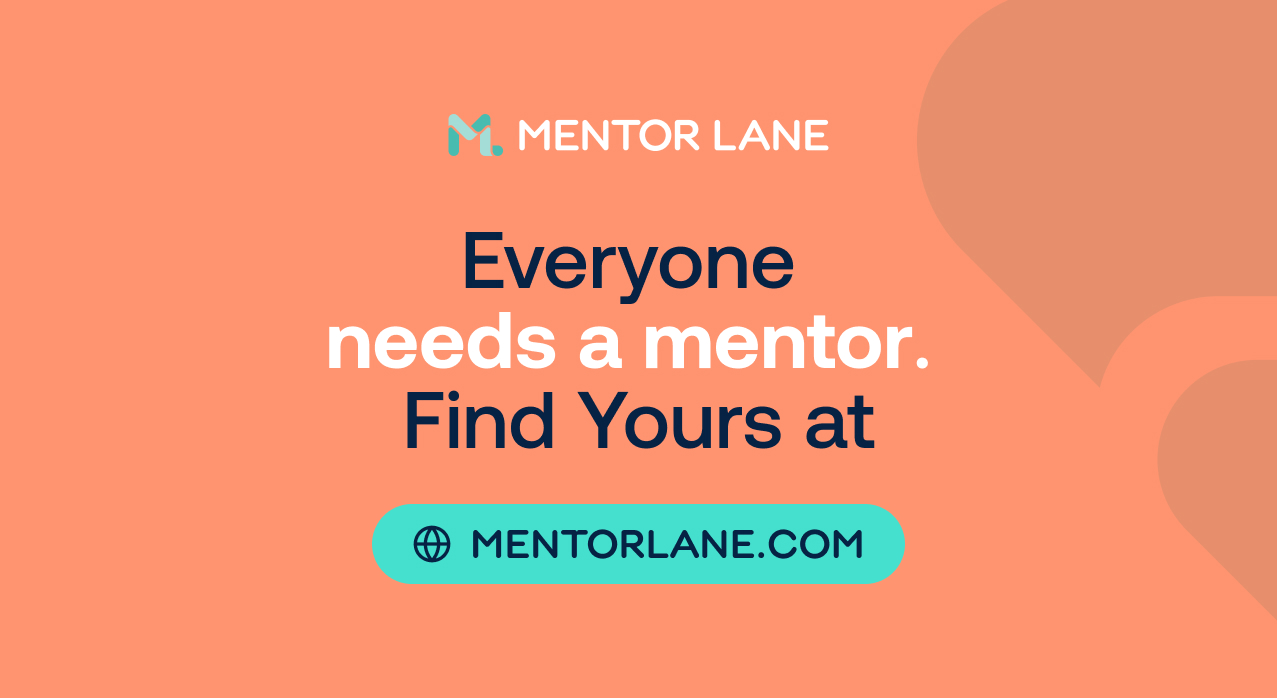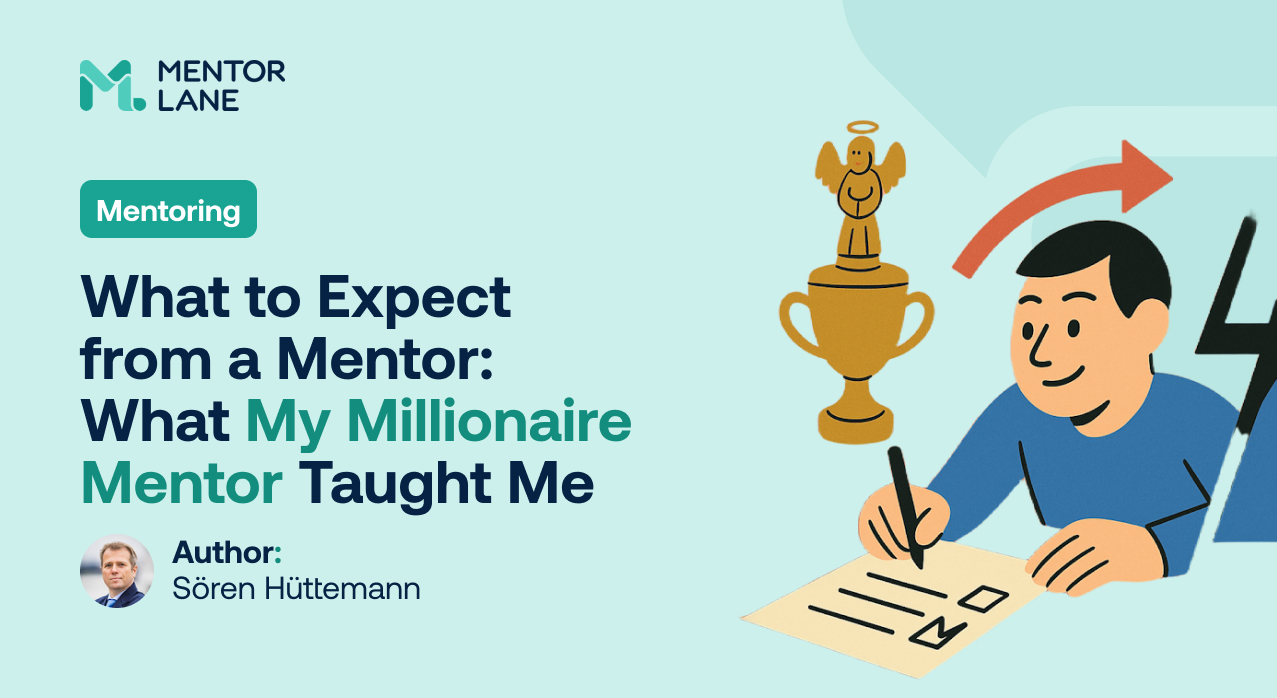News & Updates
25 Aug 13:08
6 min read
How to Prepare for Your First Mentor Meeting: A Step-by-Step Framework for Starting Strong
Learn how to effectively prepare for your first mentor meeting with our step-by-step framework. Maximise your mentorship experience from day one.

Courtney Ellis
Media Manager

How to Prepare for Your First Mentor Meeting: A Step-by-Step Framework
Download Worksheet - How to Prepare for Your First Mentor Meeting.pdf
So you’ve locked in your first mentor meeting, and you may be nervous about what to say, how to impress, and whether you'll waste their time.
But the real work doesn't happen in the conference room or virtual meeting space. It happens in the preparation work you do beforehand.
The mentoring relationship you're about to enter isn't just about career advancement or networking opportunities.
You will be creating a space where valuable insights flow both ways, where mutual respect builds something transformative. And that starts with you showing up not just prepared with questions, but prepared with clarity about yourself.
Most advice about how to prepare for the first mentor meeting focuses on surface-level tactics:
- Research your mentor's background,
- Prepare smart questions,
- Dress appropriately.
All fine advice, but it misses a key point: the mentees who create truly successful relationships with their mentors don't just come prepared with research; they come prepared with self-awareness.
Step 1: Craft Your Personal Vision Statement
Before you can seek advice about your career path, you need to know where that path is leading.
You don't need a rigid five-year plan; but you do need some understanding of the life and career you're building.
Your personal vision statement becomes the foundation for every mentorship meeting.
When both the mentor and mentee understand this vision, every conversation has real direction and purpose.
Here's how to create yours:
Start by closing your eyes and imagining yourself five years from now. Not the cautious, 'realistic' version, the version where things went really well.
- What does your typical Tuesday look like
- What kind of work energises you?
- What influence do you have on others
- What legacy are you building?
Now write it down in present tense:
Instead of
'I will be leading a team,'
write
'I lead a diverse team of innovative thinkers who trust my judgement and feel empowered to take risks.'
The present tense creates emotional connection and makes your vision feel achievable rather than distant.
As Antoine de Saint-Exupéry said:
> "A vision without a plan is just a wish. A plan without a vision is just drudgery. But a vision with a plan can change the world."
This becomes your career development compass. When your mentor offers leadership advice or suggests networking opportunities, you'll know immediately if it aligns with where you're headed.
Step 2: Ask Yourself the Questions That Matter
Most people enter their first meeting hoping their mentor will tell them what to do.
The most successful mentees come knowing themselves well enough to ask for the kind of valuable guidance they actually need.
Your time is valuable so get clear on who you are and what it is you truly need from a mentor.
Try these reflective prompts:
- What do colleagues consistently say about my work or leadership style?
- When have I felt most energised and engaged professionally?
- What challenges consistently trip me up, and what patterns do I notice?
- What influence do I currently have on others, and how do I want that to evolve?
- What aspects of my professional background am I most proud of?
- Where do I feel most authentic and confident?
These questions help you understand the gap between your current reality and your vision.
That gap becomes the roadmap for your mentoring relationship.
Instead of asking your mentor
'What should I do with my career?'
You can ask
'Given my vision and these specific challenges I've identified, what practical tips would you suggest?'
Your conversation will go from wishy-washy to actual actionable takeaways you'll know what to do with.
Step 3: Complete a Competency Analysis
This step requires brutal honesty, but it's where the real personal growth begins. You're going to rate yourself across the key competencies your vision requires.
Create three columns:
- Core Competencies Needed: Based on your vision, what skills, knowledge, and capabilities will you need?
- Current Rating (1-10): Where are you right now, honestly?
- Improvement Actions: What specific steps could close these gaps?
For example, if your vision involves leading cross-functional teams, you might rate yourself:
- Strategic thinking: 6/10
- Communication skills: 8/10
- Conflict resolution: 4/10
- Active listening: 7/10
This analysis transforms your mentor meeting from vague advice-seeking into constructive feedback opportunities.
You can say, 'I've identified conflict resolution as a critical gap for my goals. Can you share how you developed this skill?' or 'I rated myself low on strategic thinking, what frameworks have been most valuable for you?'
Your mentor will appreciate the structured approach. Instead of trying to guess what you need, they can provide super targeted guidance.
Step 4: Identify Your 'Why' (Your Fuel)
Here's what separates mentees who get personal fulfilment from their mentoring experience from those who just collect advice: clarity about their deeper motivation.
Ask yourself:
- What's driving this desire for growth right now?
- What impact do I want to have on others?
- What legacy am I building?
- How does career success connect to my broader life purpose?
Maybe you're motivated by:
- Creating more equitable opportunities for others
- Solving complex problems that matter
- Building something meaningful and lasting
- Gaining confidence to take bigger risks in your career
Understanding your 'why' helps you communicate with purpose during your mentoring session.
It also really helps your mentor understand how to best support you. Someone motivated by impact might need different guidance than someone motivated by expertise or financial security.
"Your 'why' is the purpose, cause, or belief that drives you. It's not about what you do, but why you do it."
Setting Yourself up For Success
When you arrive at your first mentor meeting with this foundation, several things happen:
You demonstrate respect for their time. Instead of expecting them to figure out how to help you, you've done the hard work of self-reflection first.
You create focus. With clear goals and self-awareness, your conversations stay productive rather than meandering through general career questions.
You enable deeper dialogue. When you know yourself well, you can engage in open and honest dialogue about real challenges and opportunities.
You establish yourself as coachable. Mentors want to work with people who are committed to growth and willing to do the work.
Your Transformation
Mentees who prepare this way report stronger and more insightful experiences.
Instead of leaving their first meeting with generic advice, they leave with specific, actionable guidance tailored to their situation. Instead of wondering what to talk about in future meetings, they have a clear agenda based on their development priorities.
The mentoring relationship becomes mutually beneficial because you're bringing insights and self-awareness to the conversation, not just problems to solve.
Mentors love to work with people who are genuinely serious about growth; it’s rewarding for them!
Future conversations build naturally on previous discussions because you have a framework for progress: you can report back on actions taken, challenges encountered, and lessons learned.
Your Preparation Checklist
Before your first mentor meeting, ensure you have:
- A written personal vision statement that excites you.
- Answers to the key reflective questions about your current state.
- A completed competency analysis with honest self-ratings.
- Clear articulation of your motivation and 'why'.
- Specific questions that emerge from this self-work.
This preparation transforms you from someone seeking general advice into someone ready for professional development partnership.
You're not just hoping for valuable insights, you're positioned to create them.
Remember: The mentoring relationship is a two-way street.
When both people show up ready to engage deeply, that's when real transformation happens.
Your mentor is investing their time because they believe in your potential. Honour that investment by showing up as the best, most prepared version of yourself.
The career advancement and personal growth that follow will exceed anything you imagined when you first asked for that meeting.

This post is also available in:
Related Posts
Sales Mentors: A 9-Round Guide to Sales Success with Michael Silberberger
Discover Michael’s 9-round guide to sales success. Learn how sales mentors help you build confidence, resilience, and lasting results.
What to Expect from a Mentor: What My Millionaire Mentor Taught Me
Curious what a millionaire mentor actually teaches? It's not about money tricks, it's mindset. Discover the surprising lessons that transformed Michael's approach to success and life.
How To Become a Mentor in Germany
Ever thought about becoming a mentor? Click here to work out if you're ready to become a mentor, and the steps to take to become a mentor in Germany.



-cd972d86.png)
